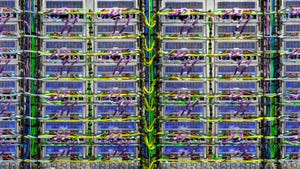Dell to Return to Public Markets With Tracking Stock Buyout
Dell Technologies, the world's largest technology company, is planning to go public again, five years after it became a private company, Bloomberg reported•The company said it will buy out its tracking stock (DMTV), created to mirror VMware's value, combining cash and shares for a deal valued at $21.7 billion•VMware will pay shareholders an $11 billion cash dividend, with Dell offering more shares or cash to make up the difference
July 3, 2018

Nico Grant (Bloomberg) -- Dell Technologies Inc., the world’s largest private technology company, announced plans to trade publicly again, re-emerging five years after its leveraged buyout as a more diverse leader in computer equipment and software, though one burdened by debt.
The tech giant will return to public markets by buying out its tracking stock, DVMT, in a cash and share-swap deal valued at $21.7 billion, Dell said in a filing Monday. The shares, worth about $17 billion as of Friday, were created to mirror the value of software maker VMware Inc., in which Dell has a controlling stake. The move aims to simplify Dell’s tangled corporate structure without weighing on its balance sheet.
As part of the deal, VMware will pay its shareholders an $11 billion special cash dividend and Dell will offer more shares -- or cash -- to make up the difference. Dell Technologies Class C common stock will become publicly listed on the New York Stock Exchange.
Founder Michael Dell took the company he founded in his dorm room private in 2013 with investment firm Silver Lake Management LLC for about $25 billion, in part to shield the company from public scrutiny as the PC business crumbled and it expanded into software and services.
The tracking stock was created to help Dell finance its $67 billion purchase of data storage company EMC Corp. in 2016, the largest technology takeover ever at the time and one that nearly tripled the company’s debt load. The deal for EMC was mostly cash, but the rest was paid through the new security linked to part of EMC’s interest in VMware. EMC owned a controlling stake in VMware and the rest of VMware is publicly traded, as is the DVMT tracking stock.
Dell said he wants VMware to remain an independent public company in an interview Monday with CNBC. He added that Silver Lake is committed to its investment in Dell despite his past offers to buy out its stake in the company.
DVMT has almost doubled since the stock was issued, closing at $84.58 on Friday, and it was up 8.2 percent at 1:27 p.m. Monday in New York. VMware, based in Palo Alto, California, makes virtualization software that helps maximize workloads on servers, as well as cloud and device management tools. VMware shares rose 10 percent to $162.19.
As chief executive officer, Dell has considered a variety of options to streamline his multicompany tech empire and help the business manage the debt, which stood at $52.7 billion in the latest fiscal first quarter, including its subsidiaries, even after paying down billions. Bloomberg first reported earlier this year that Dell was considering subsuming the tracking stock. Other options included a Dell public offering or combination with VMware, Dell said in a January filing. Under closely held ownership, Dell has sought a new direction in a more challenging market for hardware makers, diversifying away from its namesake PCs and closer to software.
The transaction “has merit, after notable financial and operational performance gains since Dell went private,” said Anand Srinivasan, technology analyst at Bloomberg Intelligence, adding that “Dell’s stock issue comes with high expectations, particularly versus Hewlett Packard Enterprise and NetApp.”
Under terms of the agreement Monday, holders of DVMT shares -- also known as Dell Technologies Class V -- will have the option to either swap their shares for Dell’s Class C common stock, or take $109 in cash per Class V share. The offer is a 29 percent premium to Class V’s closing price Friday. The deal is expected to close in the fourth quarter of 2018.
Once a household name for its line of personal computers, Dell has expanded to compete in a broader swath of the IT market. It’s now known for its lineup of servers, storage hardware and networking gear. Through its EMC acquisition, it also now has a growing suite of software tools. The company has sought a symbiotic relationship with its hardware and software -- chasing closer integrations between the two and selling both to customers to extract higher profit margins.
Dell reported an upbeat first quarter, signaling the improving corporate technology spending environment has boosted its fortunes. Demand for its servers and networking gear rose 41 percent in the period. The company leads the market in server shipments and claimed the top spot in U.S. PC shipments in the first quarter, according to Gartner.
As CEO, Dell has been pushing the company, which missed out on the cloud-computing wave early on, to develop new solutions to enable the internet of things, in which everyday devices will be digitally connected and businesses will need more computing power away from centralized data center. He has tried to revamp the company as a cloud player by offering customers software from a suite of smaller companies in which it’s invested, in a bid to take back sales from Amazon.com Inc. and Microsoft Corp.
Dell has fostered tighter product integrations with VMware that help manage customer workloads with Dell hardware and VMware software. The companies also sell each other’s products. VMware will remain a stand-alone company, and Dell will continue to own 81 percent of VMware’s common stock.
The transaction was likely “initially driven by a desire to find some liquidity for the major shareholders” by unlocking some of the cash VMware had been sitting on, said Shannon Cross, analyst at Cross Research. And for DVMT shareholders who opt for Dell Technologies Class C common stock rather than cash, “there should be a significant amount of upside” given its current low valuation, she said.
About the Author
You May Also Like



.jpg?width=300&auto=webp&quality=80&disable=upscale)





